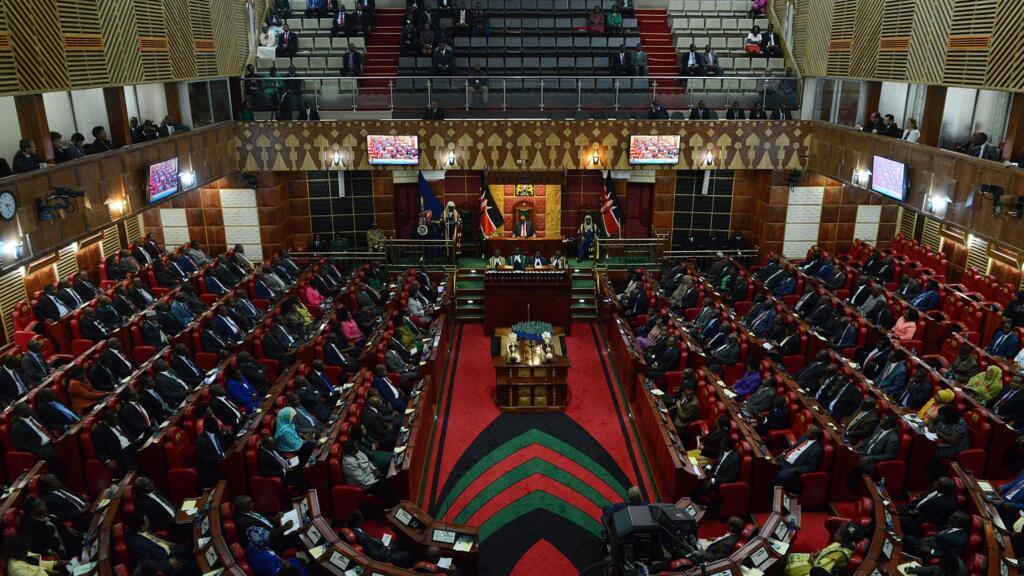Crypto Gets a Home: Kenya's Parliament Just Soaked Up a New Fintech Race

The Kenya Parliament chambers usually shook with the type of energy that is usually felt in hot debates, but today it was of a different nature. Parliamentarians, carrying the weight of a country's destiny in the digital era, were soon to pass the highly-anticipated Virtual Assets and Crypto Service Providers Bill.
And when the gavel finally fell, it was an earthquake, as well as a legislative victory shaking the corridors of African finance.
Kenya, once touted as a hub of mobile money innovation because of M-Pesa's ubiquity, has now formally legalized crypto assets in law. This is not about marking boundaries; it's a profound declaration.
Kenya's move formally ushers in a new fintech rivalry in Africa, one that will upend digital finance, from the congestion-clogged streets of Nairobi to the tech-thumping cities of Lagos and beyond. The rains have finally arrived, and with them, the seeds of a decentralized future are taking root.
The Everything-Changing Law
The Virtual Assets and Crypto Service Providers Bill is comprehensive and visionary, seeking to bring order and clarity to a hitherto unregulated realm. In its core, the law affirmatively recognizes virtual assets as legitimate financial instruments and lays down the framework for licensure and regulation of Virtual Asset Service Providers (VASPs).
They include crypto exchanges, wallet providers, and other facilities facilitating crypto transactions. It lays down the functions and responsibilities of such providers, mandates anti-money laundering (AML) and counter-terrorist financing (CTF) requirements, and lays down consumer protection measures.

One of the key purposes of this bill is to build investor confidence, locally as well as internationally. Through the establishment of legal certainty, Kenya seeks to attract high foreign direct investment into its rapidly expanding blockchain and crypto sector, in the process yielding increased tax revenue and safeguarding against frauds and illicit financial flows that have characterized the unregulated market.
Globally, Kenya's move is far from unique. It marks the latest trend of nations like the UAE, the UK, and Singapore setting themselves up as fintech hubs, eager to leverage the revolutionary power of digital assets. The message is very clear; Kenya is open for crypto business and playing by the book.
Kenya's Fintech Legacy: From M-Pesa to the Metaverse.
Kenya's "Silicon Savannah" reputation is no accident but a heritage of pioneering innovation, spearheaded by M-Pesa. Beginning in 2007, M-Pesa revolutionized money inclusion, empowering mobile phones to act as banks for the millions.

It grew up a generation accustomed to mobile wallets, peer-to-peer transfers, and wholehearted belief in digital payments. This ubiquitous system laid the all-critical foundations, ingraining digital literacy and money access into the fabric of Kenya.
The crypto law, in short, is not a revolutionary departure but a healthy and logical evolution. Having dominated mobile money, Kenya is now making the leap into the more complex, though equally thrilling, realms of decentralized finance (DeFi) and digital assets.
This is an acknowledgment that the design values of M-Pesa– accessibility, efficiency, and digital trust– can be exploited and extrapolated by blockchain technology. From sending money via cell phones to potentially trading fragmented assets in the metaverse, Kenya's journey from basic mobile payments to sophisticated crypto frameworks is a testament to its ongoing culture of innovation.
Ripple Effect: Nigeria, South Africa & The Rest of Africa.
Kenya's bold move is set to create a gigantic ripple effect across the African continent, particularly among its economic and fintech giants. The war for continental fintech dominance is underway.
Consider Nigeria, the continent's largest economy, that has had a tumultuous relationship with crypto. After years of strict controls, such as a central bank ban on cryptocurrency transactions, Nigeria's Securities and Exchange Commission (SEC) released its 2025 Investment and Securities Act (ISA), which classifies digital assets as securities.
However, even though it's not as comprehensive as Kenya's VASP regime, it is a thawing of attitude and a move towards inclusion rather than flat banning. The contrast is stark, Kenya embraces a broader virtual asset definition, while Nigeria boasts classification under existing securities laws.
South Africa, also, is another continental giant which has been leading the pack. Its Financial Sector Conduct Authority (FSCA) already classified crypto assets as financial products under its Financial Advisory and Intermediary Services (FAIS) Act as early as 2022.
This vision has provided a level of regulatory clarity that most other African nations are only now beginning to formulate.
The broader trend is clear: Africa's fintech pioneers as a whole are abandoning a policy of "crypto bans" in favor of one of establishing sound "crypto frameworks."
This pan-continental shift is driven by the inevitable economic potential of digital assets and the understanding that blanket prohibition will drive criminal activity rather than inhibit it.
The race is on; whichever country develops the most stable, innovative, and attractive regulatory environment first stands well to cement its position as Africa's flat-out fintech capital. The race is aggressive, and the stakes are high.
The Stakes: What Kenya Gains (and Loses)

Kenya's embrace of crypto regulation entails a double-edged sword, with economic potential galore on one hand and exposing the nation to inherent risks on the other.
On the side of positive opportunity, there is a huge advantage. An open regulatory environment is an attraction for global crypto exchanges, blockchain companies, and Web3 developers.
They not only bring in money but also technology, skill, and, most importantly, job opportunities to various sectors of activities ranging from tech development and cybersecurity to regulation and customer care.
Official virtual asset recognition can also supercharge remittances, a lifeline for many African economies. Digital assets offer a faster, cheaper, and more accessible alternative to current remittance channels, which can increase the diaspora's outflow of money.
Cross-border trade can also be streamlined, reducing costs and making transactions more efficient for firms with operations across African borders. Yet risks accompany such rewards.
The inherent volatility of crypto markets remains an important issue as sudden price declines can hit investors and undermine confidence. The free past also left a legacy of fraud, money laundering, and tax evasion, which Kenya's new laws aim to combat but must enforce rigorously.
The delicate balance lies in encouraging innovation without compromising consumer protection or risking criminality. Kenya's regulators will need to be nimble, sensitive, and adequately capitalized to navigate this difficult terrain.
The Cultural Undercurrent: Trust, Tech & Timing.
Besides the legislative and economic machinery, there are the underlying cultural tides propelling Kenya's crypto evolution.
Central to this is the country's overwhelmingly young population, a cohort already well-settled in technology and crypto-naturally inclined. To such a cohort, cryptocurrencies are not a figment but a very real part of their financial present and future.
The new law provides strong validation of their entrepreneurial spirit and enterprising efforts in the Web3 ecosystem, delegitimizing what is otherwise a niche pursuit.
Also, regulation plays the central role in transforming crypto's image. In most of Africa, cryptocurrencies have struggled with an association with the "shadow economy" and are often equated with scams or illicit transactions.
Formal recognition by Parliament can alter this fundamentally, making crypto an acceptable investment route and tool of economic empowerment. This digital trust transformation is critical for mass adoption and sustained growth.
Finally, Kenya's timing could not be better. While the world venture capital experiences a "crypto winter" and overall deceleration, the continent's fintech landscape is perfectly placed to draw attention.
Kenya's progressive regulatory style may again drive the continent's fintech narrative, with it as an investable and innovative fertile ground as other markets constrict. It's a bet on braveness, leveraging trust, technology, and good timing to make a leadership bet.
Rainmakers of the Next Economy

Kenya's Virtual Assets and Crypto Service Providers Bill is not just a piece of legislation; it is an anchor platform for Africa's fintech future. By providing clean legal recognition and a round-looking regulatory regime, Kenya is not just legalizing crypto but is eliciting a new generation of digital finance on the continent.
If M-Pesa was Kenya's first fintech revolution, taking mobile money to the masses and setting a world standard for financial inclusion, then formalizing crypto assets may well be its next. Saying so by taking this step itself is a very strong statement, and it indicates that Kenya is keen to stay ahead of the financial innovation curve.
Its consequences extend much beyond its borders. The rest of Africa, beset as it is with its own crypto woes, might just look to Nairobi to learn how to translate code into cash, however this time legally. The rains have finally arrived, and the seeds of a decentralized, digitally enabled economy are ready to flower.
Recommended Articles
Royal Seal on Digital Gold: UK Officially Recognizes Crypto as Property

King Charles III has given Royal Assent to the Property Act (Digital Assets etc.) 2025, legally recognizing crypto and o...
Prediction Power Unleashed: Polymarket Launches US App After Landmark CFTC Green Light

Polymarket has officially re-entered the U.S. market with a new app after securing CFTC approval, lifting long-standing ...
African Fury Erupts: Russian 'Yaytseslav' Viral Videos Spark Scandal, Victims Speak Out in Kenya and Ghana

A viral scandal involving Russian man Vladislav Lyulkov, who filmed and leaked private encounters with African women, ha...
Ghana-Russia Diplomatic Storm: Envoy Summoned Over 'Atrocious Conduct' Allegations!

Ghana has summoned the Russian Ambassador over allegations that a Russian national sexually exploited women and circulat...
African Victims Break Silence Amid Allegations Against Russian Man for Secret Filming

A complex diplomatic crisis unfolds as the Kenyan government investigates a Russian man accused of sexually exploiting w...
Fiscal Fury: Kenyan Governors Demand More Funds, Reject Sh420 Billion

The Council of Governors has rejected the National Treasury's proposed Sh420 billion equitable share for 2026/2027, deem...
You may also like...
If Gender Is a Social Construct, Who Built It And Why Are We Still Living Inside It?

If gender is a social construct, who built it—and why does it still shape our lives? This deep dive explores power, colo...
Be Honest: Are You Actually Funny or Just Loud? Find Your Humour Type

Are you actually funny or just loud? Discover your humour type—from sarcastic to accidental comedian—and learn how your ...
Ndidi's Besiktas Revelation: Why He Chose Turkey Over Man Utd Dreams

Super Eagles midfielder Wilfred Ndidi explained his decision to join Besiktas, citing the club's appealing project, stro...
Tom Hardy Returns! Venom Roars Back to the Big Screen in New Movie!

Two years after its last cinematic outing, Venom is set to return in an animated feature film from Sony Pictures Animati...
Marvel Shakes Up Spider-Verse with Nicolas Cage's Groundbreaking New Series!

Nicolas Cage is set to star as Ben Reilly in the upcoming live-action 'Spider-Noir' series on Prime Video, moving beyond...
Bad Bunny's 'DtMF' Dominates Hot 100 with Chart-Topping Power!

A recent 'Ask Billboard' mailbag delves into Hot 100 chart specifics, featuring Bad Bunny's "DtMF" and Ella Langley's "C...
Shakira Stuns Mexico City with Massive Free Concert Announcement!

Shakira is set to conclude her historic Mexican tour trek with a free concert at Mexico City's iconic Zócalo on March 1,...
Glen Powell Reveals His Unexpected Favorite Christopher Nolan Film

A24's dark comedy "How to Make a Killing" is hitting theaters, starring Glen Powell, Topher Grace, and Jessica Henwick. ...
